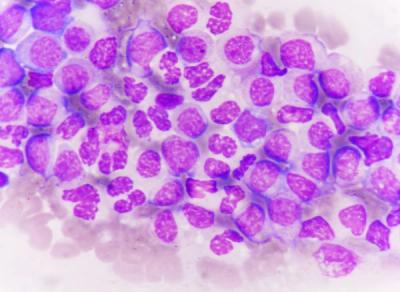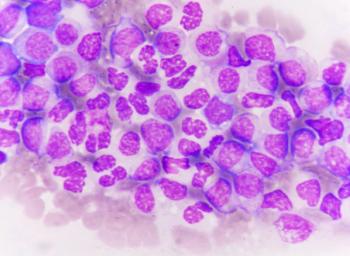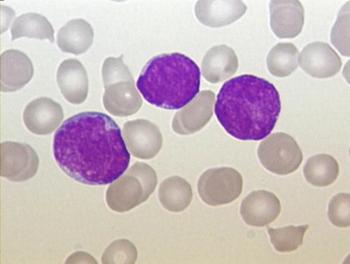
Leukemia
Latest News
Video Series

Latest Videos
Shorts





Podcasts
More News

An unadjusted indirect comparison analysis of the SEQUOIA and AMPLIFY trials revealed improved PFS with zanubrutinib vs acalabrutinib plus venetoclax.

Investigators are currently assessing QTX-2101 among patients with acute promyelocytic leukemia in a phase 3 trial.

FDA OKs Larger Nelarabine Vial in T-Cell Leukemia and Lymphoma Populations
Approval of the larger vial size may offer more dosing flexibility for pediatric and adult patients with T-cell ALL or LBL.

Data from the ENDURE trial may contextualize prior evidence suggesting an interferon-related improvement in treatment-free remission rates in CML.

New CAR T-Cell Therapy Earns FDA Breakthrough Status in T-Cell Malignancies
Data from a phase 1/2 trial support the FDA’s designation for WU-CART-007 in relapsed/refractory T-cell ALL and T-cell lymphoblastic lymphoma.

Early safety and immunogenicity data may warrant further evaluation of iTAC-XS15-CLL01 among patients with chronic lymphocytic leukemia.

Data from the phase 1/2 EVICTION study support the breakthrough therapy designation for ICT01 plus venetoclax/azacitidine in acute myeloid leukemia.

Data from the phase 3b ALIDHE study may enrich knowledge on ivosidenib plus azacitidine’s safety and efficacy in IDH1-mutated acute myeloid leukemia.

Zanubrutinib Therapies Yield Durable Results in High-Risk, Treatment-Naïve CLL/SLL
Results from arms C and D of the phase 3 SEQUOIA trial demonstrated that zanubrutinib alone or in combination with venetoclax yields positive results in CLL/SLL subpopulations.

Novel Anti-BCMA Agent Shows Preliminary Responses in R/R Multiple Myeloma
Data from a phase 1 trial may support additional clinical studies of CT0596 in relapsed/refractory multiple myeloma.

The 1-year EFS with CART19 was 90% among patients with B-ALL who had 1 or more CNS relapses.

Zanubrutinib led to a 72% reduction in the risk of disease progression or death vs bendamustine/rituximab in this CLL/SLL population.

Data from the SEQUOIA trial support the use of zanubrutinib/venetoclax in CLL or SLL regardless of del(17p)/TP53 mutation or IGHV mutational status.

Data from the BRUIN-CLL-313 study may support pirtobrutinib as a new potential standard of care for those with untreated CLL or SLL.

A total of 45% of patients with B-cell acute lymphoblastic leukemia experienced cytokine release syndrome while receiving treatment with MK-1045, of which 3% experienced grade 3 events.

Ziftomenib Combo Exhibits Tolerability/Early Activity in NPM1/KMT2A+ AML
Among patients with NPM1-mutated and KMT2A-rearranged disease, respectively, the ORR was 65% and 41% in the phase 1 KOMET-007 trial.

Ziftomenib given at 600 mg in combination with venetoclax/azacitidine produced high response rates in NPM1-mutated AML.

“Pirtobrutinib continues to show favorable efficacy and promising overall survival [OS],” said William G. Wierda, MD, PhD.

Clinical efficacy and response rates were increased with blinatumomab/ponatinib vs chemotherapy/imatinib for patients with Ph+ ALL.

The CR/CR with incomplete bone marrow recovery rate was 12.8% in patients with relapsed/refractory CLL/SLL following zanubrutinib treatment.

Investigators reported fewer dose reductions due to treatment-emergent adverse effects with pirtobrutinib vs ibrutinib in the phase 3 BRUIN CLL-314 trial.

Azacitidine plus venetoclax reduced the risk of progressive disease, persistent disease prompting therapy change, relapse, hospice, or death by 45%.

Even among Black patients with sufficient social support for clinical trial enrollment, there is inequity related to accessing allogenic transplantation.

Results from a phase 2 trial showed an ORR of 62.5% in patients receiving lisaftoclax monotherapy for CLL/SLL.

A total of 30.0% and 31.5% of families with children undergoing chemotherapy for ALL experienced household material hardship or catastrophic income loss.


































































